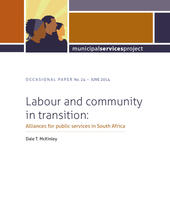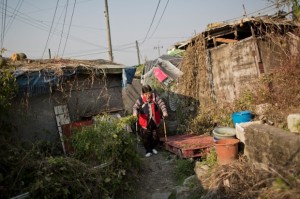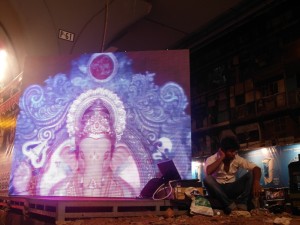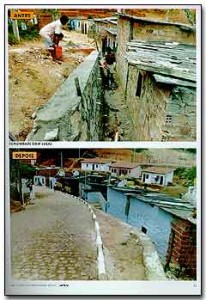Stephan Lanz – Redemption And Liberation In The City: An Introduction
Over the last decades, new megacities and postcolonial metropolises have become a laboratories and locations for new religious movements that distance themselves from traditional religious communities. This shift has largely been ignored in urban studies; in thrall to outdated theories of modernization, it has commonly equated urban modernity with secularism. Against this background, the research project Global Prayers: Redemption and Liberation in the City investigated new manifestations of the religious in urban space and the influence of urban cultures on the religious. In making use of collaborations between art and science-based researchers, Global Prayers took a new approach to exploring the urban images and sounds, spaces and practices that the religious adopts in the age of globalization. It created trans-regional networks and advances interdisciplinary approaches.
Read more: http://forums.ssrc.org/redemption-and-liberation-in-the-city
Rob Schröder/VPRO – Staying Alive In Joburg – This is Africa – Full Documentary
‘Stayin Alive in Joburg’ is a gritty take on inner-city life in Johannesburg, South Africa.
It examines the changing landscape of South Africa’s biggest post-apartheid city, providing an eye opening account of the trials and tribulations of Johannesburg’s poorest inhabitants engaged in a daily struggle for survival, as they get overlooked by authorities and development agencies fixated on elite projects, including, but not limited to the 2010 soccer world cup.
The film is informative, exposing a scandalous lack of investment in social infrastructure for the poor. And, South Africa’s race/class divide is very clearly articulated by the issues that come to the fore.
Watch this documentary for a quick catch up with life on the streets of contemporary Johannesburg. Learn more about how divestment led to decay; the battle over public spaces; the precarious lives of street traders; the struggle for basic services, decent housing and a life of dignity; a life of strife for refugee communities, the impact of the 2010 soccer world cup on Johannesburg’s residents — and more. – ‘Stayin Alive in Joburg’ is made by Rob Schröder/VPRO.
Dale T. McKinley – Labour And Community In Transition: Alliances For Public Services In South Africa
 This paper critically analyzes the context and practical experience of labour-community alliances to oppose privatization and promote public services, as they have evolved in South Africa since 1994.
This paper critically analyzes the context and practical experience of labour-community alliances to oppose privatization and promote public services, as they have evolved in South Africa since 1994.
While 1980s South Africa was rich in such broad and politically independent alliances against the oppressive apartheid system and the ravages of neoliberal capitalism, following the 1994 democratic transition the labour movement largely embraced the neoliberal corporatism promoted by the ANC-run state, which increased the social distance between employed workers and poor communities. Consistent attempts to repress community-led dissent in response to the political and socio-economic failures of the ‘new’ democracy, and the resulting delegitimization of community struggles related to the nature of public institutions and delivery of public services, undermined further the bases for unity.
This paper analyzes case briefs of the few labour-community alliances that exist today – the South Durban Environmental Community Alliance; the Cape Town Housing Assembly and South African Municipal Workers Union (SAMWU); and the Eastern Cape Health Crisis Action Coalition – as a means to surface their nature, challenges and successes. Collaboration is largely temporary and informal, involving small numbers of committed individuals from both ‘sides’.
Twenty years after the first free and fair elections in South Africa, the harsh realities are that strong, organic labour-community alliances have virtually disappeared and there is a growing disconnect between their respective politics and practical struggles. The positive past of labour-community mobilization in the country needs to be reclaimed both in thought and practice. If there is to be a coherent ‘alternative’ movement forward, labour and community have to find ways to talk with and learn from each other, to find a common language for and approach to, what kind of society, what kind of state and most crucially what kind of ‘public’ they desire.
See more at: http://municipalservicesproject.org/labour-and-community-transition
See also: http://www.dalemckinley.org/
CNBCAfrica – Addressing South Africa’s Housing Backlog
About 2.1 million People are in need of housing in South Africa and this has remained a big issue this year. CNBC Africa speaks to Stuart Wilson Executive Director Social Economic Rights Institute (SERI) on how the new government might address this important issue.
MIT ~ History – What Is Urban Upgrading?
Since the 1960s, cities in developing countries have faced an unprecedented rate of urbanization and increasing poverty. Uncontrolled proliferation of slums was the result. In general, these unplanned and under served neighborhoods are occupied by squatters without legal recognition or rights. The populations of slums lack the most basic municipal services, such as water supply, sanitation, waste collection or infrastructure, and thus are exposed to disease, crime and natural disasters.
Governments have tried to deal with this problem in different ways. However, their urban policies often failed because of bad governance, corruption, inappropriate regulation, dysfunctional land markets, and, above all, an absence of political will. One response to prevent augmenting urban poverty involved the relocation of residents to resettlement sites that were usually outside of the city. Yet, slums emerged in city centers because these were places where the poor can find work more easily. Consequently, moving the people or replacing their physical facilities did not work well. Governments not only had to spend resources clearing slums and resettling inhabitants, but also later had to finance public transportation to facilitate access to employment in the central city.
Read more: http://web.mit.edu/urbanupgrading/history.html
Jo Blason – Gangnam, Shanty-Style: Life In Seoul’s Guryong Village Slum – In Pictures

Luo In-soon walks to her Guryong Village home. In 2011, residents received temporary residency cards so they could vote for the first time. Photograph: Lam Yik Fei/Getty Images
July 2014. Guryong offers a shocking contrast to life in the rest of Seoul’s gleaming Gangnam district. A billion-dollar redevelopment plan has sparked fierce debate over what will become of its residents.
http://www.theguardian.com/seouls-guryong-village-slum-in-pictures





